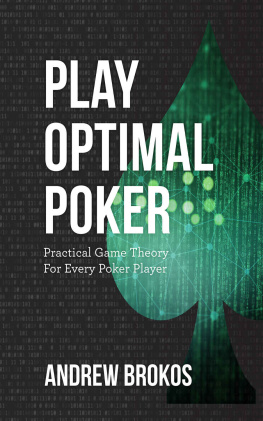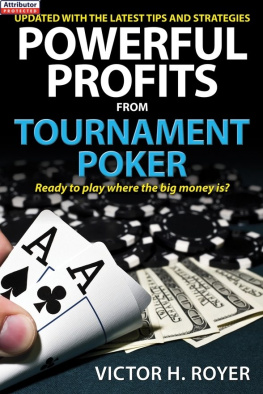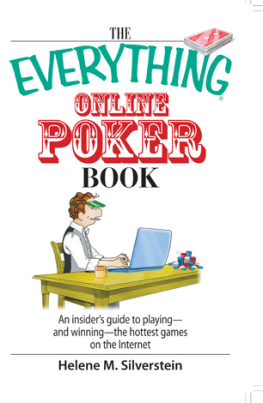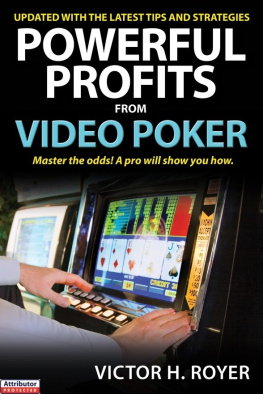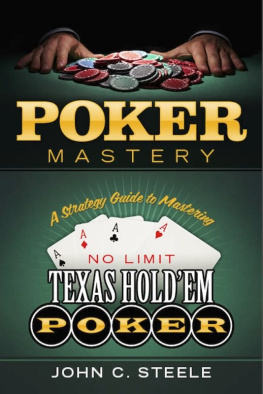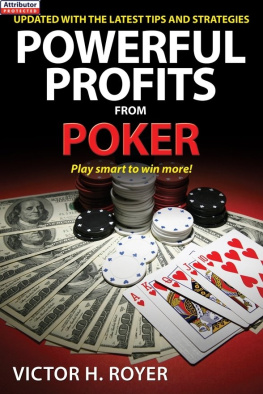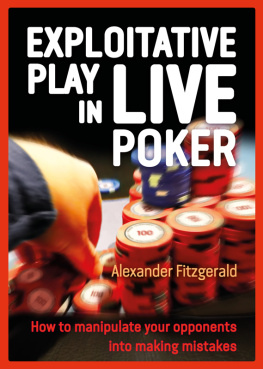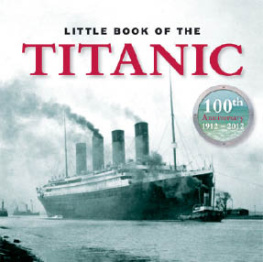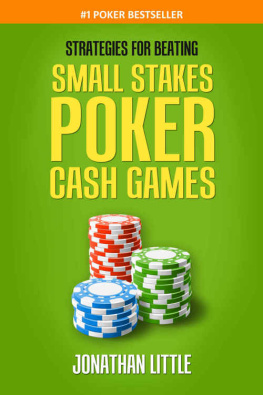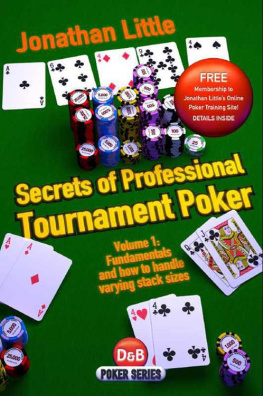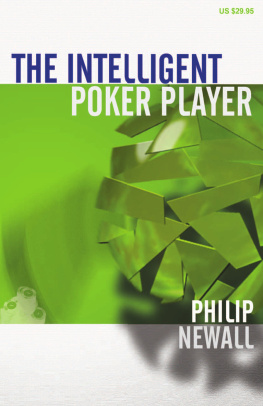Play
Optimal
Poker
Practical Game Theory for Every Poker Player
by Andrew Brokos
Play Optimal Poker
Copyright 2019 Andrew Brokos
All rights reserved. This book or any portion thereof may not be reproduced or used in any manner whatsoever without the express written permission of the publisher except as permitted by US copyright law. To request permission:
www.thinkingpoker.net
Contents
Introduction
You are playing No-Limit Texas Hold 'Em. The river card has just been dealt, and it's a fourth club. You double-check your cards, but unfortunately, they have not changed: you've got no flush, no pair, and, you figure, no shot of winning this pot. Unless you bluff.
As you gather your chips, you watch your opponent for a glimmer of fear or excitement, but he's stone-faced. The clock is ticking. It's decision time. Are you all-in?
Maybe, before you answer, you want more information. What exactly is on the board? What was the action leading up to the river? Who is your opponent? Is his playing style wild, conservative, or somewhere in between? How many chips do you have? How much is in the pot?
I could answer all these questions and more - I could even tell you your opponent's hand! - and you still might not know whether you should bluff. The critical bit of information you don't have is what your opponent will do after you bet, whether he will call or fold. In most cases, you won't be able to determine that with certainty no matter how much other information you have.
This is the essence of what makes poker fun and interesting in a way that other gambling games are not. Unlike in craps or blackjack, you do not make decisions in a vacuum. Your payoff , what you win or lose, depends not only on the choices that you make but also on the choices that other players make.
Because you and your opponents have opposing interests - every dollar you win is a dollar someone else loses - there is conflict and deception. To get the outcomes you want, you need your opponent to take the actions that are best for you. But typically, whats good for you is bad for him, and so he will try not to take the actions you want him to take. Your opponent will attempt to deceive you about what he plans to do, just as you will attempt to deceive him about what you want him to do. He will study you carefully, attempting to predict your future actions just as you attempt to predict his.
The frustrating thing about poker is that you can never be sure about your opponents intentions, which means that in most cases you cannot be sure about your own best play. Even after the fact, you wont know whether your play was a mistake.
As human beings, were used to learning from experience. If we do something and get a good result, we do it again. If we get a bad result, we try something different.
Poker doesnt work that way, which makes it impossible to learn through experience alone. Sure, youll get better with practice, but youll also pick up some bad habits.
Not only are results not a reliable guide to whether you made a mistake, but there is no reliable guide . I spent the first decade of my career grasping in the dark, trying to grab something firm but coming away with handfuls of sand.
Like most people, I started by looking to the results. If I got a fold, then my bluff was a good one, and if I didnt, then it was a mistake.
Then I learned about ranges, and I realized that sometimes, when my bluffs are called, its just bad luck. If I go all-in on the river and my opponent calls with quads, that doesnt tell me anything, because that wasnt the hand I was expecting him to fold. If he could have had many weaker hands that would have folded, then my bluffs might have been good a good one that just got unlucky.
But how are you supposed to know what your opponent could have had or would have done? You can ask, but he might not tell you. Or he might lie. Or he might just not know the answer himself. Plenty of players have no self-awareness about their own ranges.
So, I flailed around, like pretty much everyone was doing in those days. I struck upon some things that worked, but I couldnt always tell you why they worked, and that made it hard to distinguish between a bad idea and a good idea that just didnt work this time.
My quest for firm footing eventually led to game theory. While game theory doesnt exactly offer an escape from uncertainty, it does offer a way through, which is the best youre going to get in this cruel game of ours.
Game theory is about making decisions under conditions of uncertainty. We dont know what our opponents have, but we know what they could have. We dont know what theyre going to do, but we know what they could do.
The good news is that your opponents must grapple with the same uncertainty. They dont know what you have, and they dont know what youre going to do. Uncertainty is as much their enemy as it is yours. When you get right down to it, poker isnt a battle of guts or wits, its a contest of who can make better decisions under conditions of uncertainty, and game theory can be a valuable ally.
This realization revolutionized how I thought about the game. Now, when I play poker, my objective isnt to play tight or to play circles around my opponents or even to win money. My objective is to give my opponents difficult decisions, to put them in spots where they have no idea what the right play is. I cant force them to make mistakes, but I can create the conditions that lead to mistakes, and it turns out that thats both profitable and fun.
Why You Need Game Theory
Theres a pernicious myth out there that game theory is only for elite players in tough games. Not true. Game theory is for anyone whos ever been unsure about what to do at the poker table. If that doesnt describe you, then please get in touch I want to read your book.
Oxford Dictionaries describe game theory as "the branch of mathematics concerned with the analysis of strategies for dealing with competitive situations where the outcome of a participant's choice of action depends critically on the actions of other participants." In short, game theory helps us formulate strategies that will be reasonably good regardless of what actions our opponents take.
Once, only the most mathematically astute poker players spent much time thinking about game theory. It helped them better understand some broad strategic principles, but the complexity of poker necessitated a lot of guesswork when it came to the details.
Now, however, dedicated software and ever-cheaper processing power enable any player to apply game theoretic principles to poker with rigor and precision. Even if you don't personally use software to study poker, if you've read a poker book or watched an instructional video in the last few years, then you've benefited indirectly from the insights that such software provides.
Game theory is not a panacea. It is not the only lens through which one should view poker, but it is an increasingly indispensable one. If you don't understand the basic game theory that underlies poker, then you don't really understand the game at all. At best, you've developed, through trial and error, strategies that work against certain types of opponents. You may be comfortable in situations that you encounter commonly, but you probably struggle in less familiar situations, and as your opponents become more adept with game theory, they will increasingly put you in difficult spots.
Game theory solver software generates extremely complex strategies, but you do not have to understand them in-depth or implement them precisely in order to learn from them. Indeed, unless you are competing at the very highest level, your goal when studying game theory should not be to memorize the details for any specific situation. Rather, your goal should be to extract broad principles that can guide you in a variety of situations when you are unsure about the best strategy.
Next page
